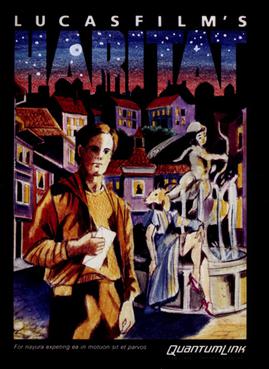
The term chat room, or chatroom, is primarily used to describe any form of synchronous conferencing, occasionally even asynchronous conferencing. The term can thus mean any technology, ranging from real-time online chat and online interaction with strangers to fully immersive graphical social environments.

A virtual community is a social work of individuals who connect through specific social media, potentially crossing geographical and political boundaries in order to pursue mutual interests or goals. Some of the most pervasive virtual communities are online communities operating under social networking services.

Yahoo! Messenger was an advertisement-supported instant messaging client and associated protocol provided by Yahoo!. Yahoo! Messenger was provided free of charge and could be downloaded and used with a generic "Yahoo ID" which also allowed access to other Yahoo! services, such as Yahoo! Mail. The service also offered VoIP, file transfers, webcam hosting, a text messaging service, and chat rooms in various categories.

Habbo, also called Habbo Hotel, is a virtual world and massively multiplayer online game. It is owned and operated by Sulake. Founded in 2000, Habbo has expanded to nine online communities, with users from more than 150 countries. As of October 2020, 316 million avatars have been registered in the game.

In computing, an avatar is a graphical representation of a user, the user's character, or persona. Avatars can be two-dimensional icons in Internet forums and other online communities, where they are also known as profile pictures, userpics, or formerly picons. Alternatively, an avatar can take the form of a three-dimensional model, as used in online worlds and video games, or an imaginary character with no graphical appearance, as in text-based games or worlds such as MUDs.

Habitat is a massively multiplayer online role-playing game (MMORPG) developed by LucasArts. It is the first attempt at a large-scale commercial virtual community that was graphic based. Initially created in 1985 by Randy Farmer, Chip Morningstar, Aric Wilmunder and Janet Hunter, the game was made available as a beta test in 1986 by Quantum Link, an online service for the Commodore 64 computer and the corporate progenitor to AOL. Both Farmer and Morningstar were given a First Penguin Award at the 2001 Game Developers Choice Awards for their innovative work on Habitat. As a graphical MUD it is considered a forerunner of modern MMORPGs unlike other online communities of the time. Habitat had a GUI and large user base of consumer-oriented users, and those elements in particular have made Habitat a much-cited project and acknowledged benchmark for the design of today's online communities that incorporate accelerated 3D computer graphics and immersive elements into their environments.

The Palace is a computer program to access graphical chat room servers, called palaces, in which users may interact with one another using graphical avatars overlaid on a graphical backdrop. The software concept was originally created by Jim Bumgardner and produced by Time Warner in 1994, and was first opened to the public in November 1995.

Google Talk was an instant messaging service that provided both text and voice communication. The instant messaging service was variously referred to colloquially as Gchat, Gtalk, or Gmessage among its users.

Xfire was a proprietary freeware instant messaging service for gamers that also served as a game server browser with various other features. It was available for Microsoft Windows. Xfire was originally developed by Ultimate Arena based in Menlo Park, California.

Meebo was an instant messaging and social networking service provider. It was founded in September 2005 by Sandy Jen, Seth Sternberg, and Elaine Wherry, and was based in Mountain View, California. Initially the company offered a web-based instant messenger service, extending its offer in more general online chat and even social networking directions. In June 2012, Google acquired Meebo to merge the company's staff with the Google+ developers team.

PlayStation Home was a virtual 3D social gaming platform developed by Sony Computer Entertainment's London Studio for the PlayStation 3 (PS3) on the PlayStation Network (PSN). It was accessible from the PS3's XrossMediaBar (XMB). Membership was free but required a PSN account. Upon installation, users could choose how much hard disk space they wished to reserve for Home. Development of the service began in early 2005 and it launched as an open beta on 11 December 2008. Home remained as a perpetual beta until its closure on 31 March 2015.
BarbieGirls.com was an online virtual world created by Mattel, based on the Barbie brand. It opened on April 24, 2007 and eventually closed on June 1, 2011. International versions of the site closed on April 30, 2011. Mattel also released a line of MP3 players that looked like avatars from the website, these devices came with a free VIP membership for the site.
Omegle was a free, web-based online chat service that allowed users to socialize with others without the need to register. The service randomly paired users in one-on-one chat sessions where they could chat anonymously. It operated from 2009 to 2023.
Tinychat is an online chat website that allows users to communicate via instant messaging, voice chat, and video chat. It offers instant opportunities for people to meet and the ability for users to create their own virtual chat room on any topic or category. Tinychat is a web-based platform that works on HTML5 compatible browsers or standalone apps for Android or iOS. The chat rooms can contain a rolling maximum of 12 video and audio feeds. Tinychat, including all of its services, is owned by PeerStream.

Fantage was a MMORPG involving a virtual world containing a range of online games and activities, developed by Fantage Inc. The game featured a customizable cartoon avatar, called a "Fantagian", that users can customize with items ranging from hair to clothing and accessories. Fantage was released to the general public on March 17, 2008, and had since expanded into a large online community— the game had over 16 million registered users by January 2012 and over 30 million by December 2014.

Introduced in 2011, the Samsung Galaxy Tab 10.1 is an Android-based tablet computer designed and manufactured by Samsung. It is part of the Samsung Galaxy Tab series, and features a 10.1-inch (260 mm) display and a 1 GHz dual-core Nvidia Tegra 2 processor.

ChatON was a global mobile communication service provided by Samsung Electronics from September 2011 to March 2015.

Facebook Home was a user interface layer for Android smartphones. Developed by the company then known as Facebook, the software was designed to be a drop-in replacement for the device's existing home screen ("launcher"). It provided a replacement home screen that allowed users to easily view and post content on Facebook along with launching apps, a replacement lock screen that displayed notifications from Facebook and other apps, and an overlay which allowed users to chat via Facebook messages or SMS from any app. Facebook Home was unveiled at a press event on April 4, 2013, and was released on April 12, 2013 for a limited selection of devices from HTC and Samsung Electronics—including the HTC First, a new smartphone pre-loaded with the software. Facebook is no longer supporting or providing updates for Facebook Home.

Vive is a members-only mobile video chat community. The company has offices in San Francisco, Berlin and Hannover. It is free to use.
Isaiah Turner is an American Internet entrepreneur and software engineer. He is known as the co-founder of the mobile apps Monkey, Poparazzi, and Gas.















